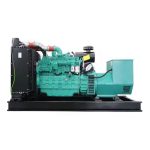Introduction
The integration of renewable energy sources such as solar and wind power into the traditional power grid has brought about significant advancements in the field of energy generation and distribution. However, the intermittent nature of these renewable sources poses challenges in maintaining grid stability and reliability. Diesel generators have emerged as a reliable backup power source that can complement renewable energy systems in smart grid applications. This article explores the role of diesel generators in smart grid applications, their benefits, challenges, and potential future developments.
Overview of Smart Grid and Renewable Energy Integration
Smart grids are modernized electricity networks that utilize advanced technologies to optimize the generation, distribution, and consumption of electricity. These grids incorporate digital communication and automation systems to improve efficiency, reliability, and sustainability. One of the key objectives of smart grids is to integrate renewable energy sources into the existing power infrastructure to reduce carbon emissions and enhance energy security.
Renewable energy sources such as solar, wind, and hydro power are essential components of the transition to a cleaner and more sustainable energy future. However, the variability and unpredictability of these sources present challenges in balancing supply and demand in the grid. Energy storage systems and backup power sources such as diesel generators play a crucial role in addressing these challenges and ensuring grid stability.
Role of Diesel Generators in Smart Grid Applications
Diesel generators have long been used as backup power sources in various industrial, commercial, and residential applications. In smart grid environments, diesel generators can serve multiple purposes, including:
1. Peak Shaving: Diesel generators can be used to supplement grid power during peak demand periods, reducing strain on the grid and avoiding potential blackouts.
2. Grid Support: Diesel generators can provide reactive power support and voltage regulation to stabilize the grid and improve power quality.
3. Black Start Capability: In the event of a grid outage, diesel generators can be used to restart critical infrastructure and restore power to essential services.
4. Energy Security: Diesel generators offer a reliable source of backup power in case of disruptions to renewable energy sources or grid failures.
Benefits of Diesel Generators in Smart Grid Applications
The integration of diesel generators into smart grid applications offers several benefits, including:
1. Reliability: Diesel generators are highly reliable and can provide continuous power supply for extended periods, ensuring uninterrupted operation of critical infrastructure.
2. Flexibility: Diesel generators can be easily deployed and scaled to meet varying power demands, making them suitable for a wide range of applications.
3. Efficiency: Modern diesel generators are designed to operate efficiently, with high fuel efficiency and low emissions, reducing the environmental impact of power generation.
4. Cost-Effectiveness: Diesel generators can provide cost-effective backup power solutions compared to other energy storage technologies, especially in remote or off-grid locations.
Challenges of Diesel Generators in Smart Grid Applications
Despite their benefits, diesel generators face several challenges in smart grid applications, including:
1. Environmental Impact: Diesel generators produce emissions such as nitrogen oxides (NOx) and particulate matter, contributing to air pollution and climate change.

2. Fuel Dependence: Diesel generators rely on fossil fuels, making them vulnerable to fluctuations in fuel prices and supply chain disruptions.
3. 500kw diesel generator for remote industrial applications and Operation: Diesel generators require regular maintenance and monitoring to ensure optimal performance, increasing operational costs and complexity.
4. Noise and Vibration: Diesel generators can generate noise and vibration, which may be undesirable in residential or urban areas.
Future Developments and Innovations
To address the challenges associated with diesel generators in smart grid applications, researchers and industry stakeholders are exploring innovative solutions and technologies. Some of the potential developments in this field include:
1. Hybrid Systems: Integrating diesel generators with renewable energy sources and energy storage systems to create hybrid power systems that optimize energy generation and utilization.
2. Advanced Controls: Implementing intelligent control systems that optimize the operation of diesel generators based on real-time grid conditions and demand patterns.
3. Emission Reduction Technologies: Adopting advanced emission control technologies such as selective catalytic reduction (SCR) and diesel particulate filters to minimize the environmental impact of diesel generators.
4. Energy Management Systems: Deploying sophisticated energy management systems that coordinate the operation of diesel generators, renewable energy sources, and energy storage systems to maximize efficiency and reliability.
Conclusion
Diesel generators play a critical role in smart grid applications by providing backup power, grid support, and energy security. While they offer numerous benefits, diesel generators also face challenges related to environmental impact, fuel dependence, and maintenance requirements. By leveraging innovative technologies and solutions, the integration of diesel generators into smart grids can be optimized to enhance efficiency, reliability, and sustainability in the power sector. As the energy landscape continues to evolve, diesel generators will remain a valuable asset in bridging the gap between renewable energy sources and grid stability.
